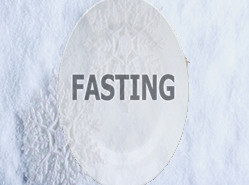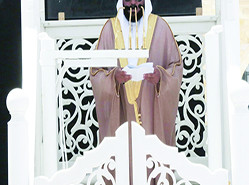content of level
Animals Slaughtered by People of Earlier Revelations
Some scholars permit that Muslims eat permissible animals slaughtered by people of earlier revelations if they live in non-Muslim countries. But electrically shocked animals are prohibited unanimously.
Congratulating non-Muslims on Their Religious Feasts
Muslim scholars have 2 opposite views on congratulating and joining non-Muslims on their religious feasts. The first view considers it forbidden. The other sees it permissible if they are at peace with Muslims
Burying a Muslim in a Coffin
Muslim scholars have 2 different views on burying a Muslim in a coffin in societies where Muslims are minorities. The first discourages it and the second permits it in certain conditions as in case of soft land.
Burial of Muslims in Non-Muslim Graveyards
There are 3 views on the burial of Muslims in non-Muslim graveyards in non- Muslim countries. The first permits it as a matter of necessity, the 2nd is against, and the 3rd permits it in a special section for Muslims.
Smelling Wines
The mere smell of wine does not lead to intoxication and it is not considered as drinking as it does not cloud one’s mind. But it is preferable for a Muslim to avoid situations where he is surrounded by drunk people.
Offering Condolences to Non-Muslims
Scholars express different views on offering condolences to non- Muslim. Those who support it say that it is appropriate for a Muslim to condole a non-Muslim, as if they do not it may be interpreted as hostility.
Enforcing Mandatory Punishments in non-Muslim Countries
If a Muslim commits a sin that carries a mandatory punishment it is preferable to keep it private, repent and ask for God’s forgiveness. If he insists to be punished, then this should be referred to a Muslim ruler.
Setting off Taxes against Zakat
Zakat is imposed by God and one of the 5 pillars of Islam while taxes are imposed by the rulers. They are totally different and most scholars agree that the payment of taxes does not exempt anyone from paying zakat.
Seeking a non-Muslim Witness and Testifying for a non-Muslim
Based on God’s word in Quran it is permissible for Muslims to request a non-Muslim to be a witness for him. And it is also permissible to witness for a non-Muslim at the court provided that the truth has been testified
Swearing by the Gospel
A Muslim does not swear by any other Religious book than the Quran. In non-Muslim countries a Muslim may be required to swear by the Gospel in a court of law but it is forbidden, as what is distorted is not God’s words.
Placing One’s Hand on the Torah or the Gospel to Testify under Oath
A Muslim in non-Muslim countries court might be asked to place his hand on the Torah or the Bible for oath. He must request to put his hand on the Quran; if his request is rejected then he might place his hand on them.
Arbitration in Disputes
In non-Muslim countries where courts follow civil law, arbitration is the Islamic alternative to settle disputes. It is the proper channel in such cases and arbitration committee members should be of integrity
Studying and Teaching Man-Made Laws
Muslims can study and teach man-made laws as long as they have enough knowledge of Islam and Islamic laws. They will also get a great reward if they aim to explain such laws flaws and the superiority of Islamic law.
Building Islamic Centres with Zakat Funds
Using zakat funds to build Islamic centers is not approved by all scholars. The view approving it is based on the fact that Islamic centers’ role is the advocacy of Islam, so they may be included in the ways of zakat.
Working as a Lawyer
It is permissible for a Muslim lawyer to work in non-Muslim countries in civil courts. As long as he believes that the case is legitimate and he aims to help those suffering injustice otherwise it is forbidden.
Putting Disputes to non-Islamic Courts
Muslim disputes should be settled through Islamic law. In case of necessity in non-Muslim countries, they can put their disputes to civil courts but it is forbidden to take something that is not rightfully.
Working in a Man-Made Judicial System
Muslim cannot be a judge under non-Islamic authorities unless he takes this position with intention of giving justice to Muslims and non-Muslims, provided that his own decision is in agreement with Islamic law.
Fasting in Polar Areas
In some areas the beginning and end of the fasting day cannot be determined or the day is too long or too short. Some scholars said that they could follow Mekkah or Madinah or the nearest cities with moderate timings.
Prayer in Polar Areas
Questions are often asked about the timing of prayers in remote areas, where prayers’ time is blurred. In these areas prayer time is determined on the basis of analogy with clear prayers time at the nearest place.
The Friday and Eid Sermon in Other Languages
In non- Muslim countries other languages might be used for Eid and Friday sermon. Some scholars prefer that the essentials should be in Arabic. Otherwise, it might be in Arabic then translated to other language.




















